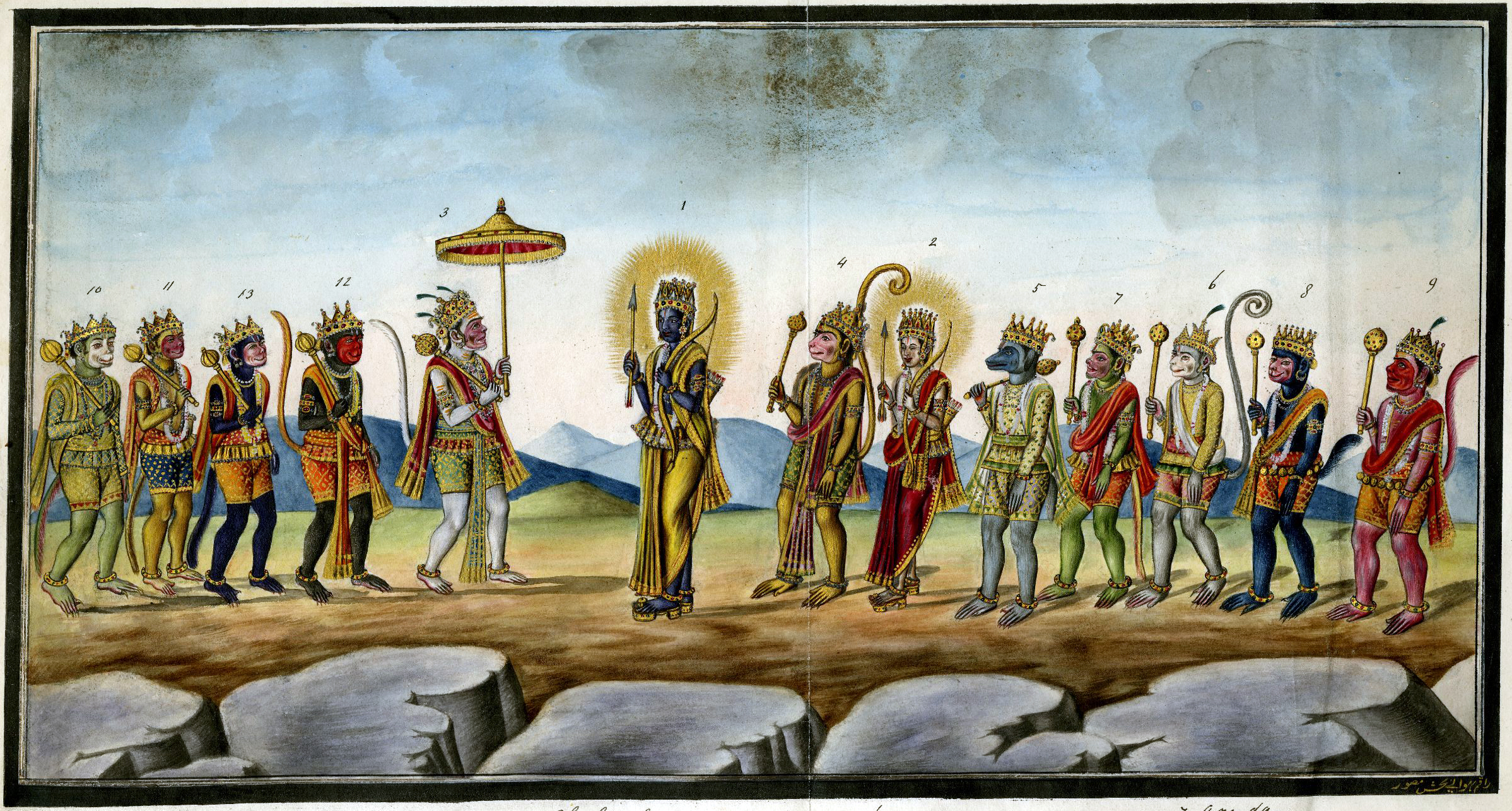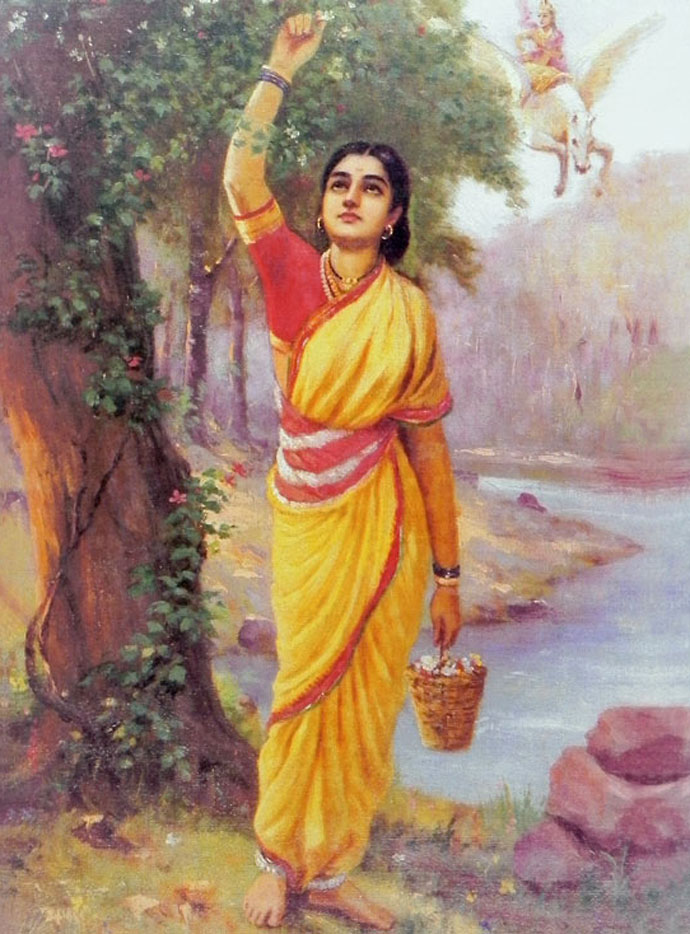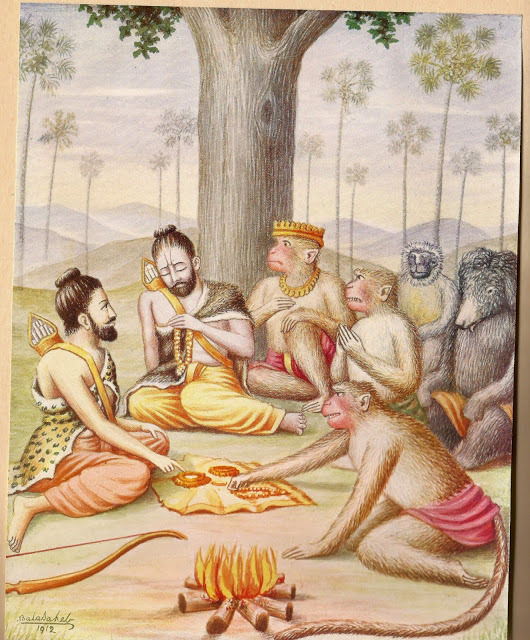|
Aruna (Hinduism)
Aruna () is the charioteer of Surya (the sun god) in Hinduism. He is the elder brother of Garuda. Aruna and Garuda are the sons of Vedic sage Kashyapa and his wife Vinata, daughter of Prajapati Daksha. His children were the mighty vultures Sampati and Jatayu. He is also found in Buddhism and Jainism literature and arts. History Birth Aruna is found in different, inconsistent Indian legends. In the epic Mahabharata,Mani p. 55 he was born prematurely and partially developed from an egg. According to this version, Kashyapa Prajapati's two wives Vinata and Kadru wanted to have children. Kashyapa granted them a boon. Kadru asked for one thousand 'Dirghadeha' (meaning long bodied) Nāga (serpent) sons, while Vinata wanted only two yet extremely strong 'Divyadeha' (meaning emitting golden aura from body), who would excel the thousand sons of Kadru. Kashyapa blessed them, and then went away to a forest. Later, Kadru gave birth to one thousand eggs, while Vinata gave birth to two ... [...More Info...] [...Related Items...] OR: [Wikipedia] [Google] [Baidu] |
Vinata
In Hinduism, Vinata (, ) is the mother of Aruna (Hinduism), Aruna and Garuda. She is one of the daughters of Prajapati Daksha. She is married to Kashyapa, along with several of her sisters. She bears him two sons, the elder being Aruna and the younger being Garuda. Legend Vinata is a daughter of Daksha. Kadru is her elder sister, and when they both lived with Kashyapa as his wives, and attended to all his comforts, he blessed them by granting each of them a boon. Kadru asked for a thousand nāga, naga sons who should be valiant. Prompted by her sister's demand for sons, Vinata asked for only two sons, who should be more powerful and brighter than Kadru's children. Kashyapa granted them their wishes. After his wives became pregnant, he advised them to look after the children, and then left for his penance in the forest. Birth of Aruna According to the Mahabharata, Kadru went on to lay a thousand eggs, and Vinata, two eggs. Both of them kept their eggs in hot pots. In their fiv ... [...More Info...] [...Related Items...] OR: [Wikipedia] [Google] [Baidu] |
Brahma
Brahma (, ) is a Hindu god, referred to as "the Creator" within the Trimurti, the triple deity, trinity of Para Brahman, supreme divinity that includes Vishnu and Shiva.Jan Gonda (1969)The Hindu Trinity, Anthropos, Bd 63/64, H 1/2, pp. 212–226.Jan Gonda (1969)The Hindu Trinity, Anthropos, Bd 63/64, H 1/2, pp. 218–219. He is associated with creation, knowledge, and the ''Vedas''. Brahma is prominently mentioned in Creation myth, creation legends. In some ''Puranas'', he created himself in a golden embryo known as the Hiranyagarbha. Brahma is frequently identified with the Rigvedic deities, Vedic god Prajapati.;David Leeming (2005), The Oxford Companion to World Mythology, Oxford University Press, , page 54, Quote: "Especially in the Vedanta Hindu Philosophy, Brahman is the Absolute. In the Upanishads, Brahman becomes the eternal first cause, present everywhere and nowhere, always and never. Brahman can be incarnated in Brahma, in Vishnu, in Shiva. To put it another way, eve ... [...More Info...] [...Related Items...] OR: [Wikipedia] [Google] [Baidu] |
Characters In The Ramayana
'' Ramayana'' is one of the two major Sanskrit ancient epics (''Itihasa''s) of Hindu literature. It was composed by sage Valmiki. This is a list of important figures that appear in the epic. A * Agastya: Rishi (sage). Son of sage Pulastya and brother of sage Vishrava. He was an uncle of Ravana. Agastya and his wife Lopamudra met Rama, Sita, and Lakshmana during their exile and gave them a divine bow and arrow. * Ahalya: Wife of the sage Gautama Maharishi. Many Hindu scriptures say that she was seduced by Indra (the king of the gods), cursed by her husband for infidelity, and liberated from the curse by Rama (an avatar of Vishnu). * Akampana: A a maternal uncle of Ravana. He was one of ten sons of Sumali and Ketumathi. He also had four sisters. He was one of the survivors of the battle between Khara and Dushana along with Shurpanakha. After escaping the deadly carnage, he instigated Ravana to kidnap Sita, thus indirectly making him one of the masterminds behi ... [...More Info...] [...Related Items...] OR: [Wikipedia] [Google] [Baidu] |
University Of California Press
The University of California Press, otherwise known as UC Press, is a publishing house associated with the University of California that engages in academic publishing. It was founded in 1893 to publish scholarly and scientific works by faculty of the University of California, established 25 years earlier in 1868. As the publishing arm of the University of California system, the press publishes over 250 new books and almost four dozen multi-issue journals annually, in the humanities, social sciences, and natural sciences, and maintains approximately 4,000 book titles in print. It is also the digital publisher of Collabra and Luminos open access (OA) initiatives. The press has its administrative office in downtown Oakland, California, an editorial branch office in Los Angeles, and a sales office in New York City, New York, and distributes through marketing offices in Great Britain, Asia, Australia, and Latin America. A Board consisting of senior officers of the University of Cali ... [...More Info...] [...Related Items...] OR: [Wikipedia] [Google] [Baidu] |
Robert Graves
Captain Robert von Ranke Graves (24 July 1895 – 7 December 1985) was an English poet, soldier, historical novelist and critic. His father was Alfred Perceval Graves, a celebrated Irish poet and figure in the Gaelic revival; they were both Celticists and students of Irish mythology Irish mythology is the body of myths indigenous to the island of Ireland. It was originally Oral tradition, passed down orally in the Prehistoric Ireland, prehistoric era. In the History of Ireland (795–1169), early medieval era, myths were .... Robert Graves produced more than 140 works in his lifetime. His poems, his translations and innovative analysis of the Greek myths, his memoir of his early life—including his role in World War I—''Good-Bye to All That'' (1929), and his speculative study of poetic inspiration ''The White Goddess'' have never been out of print. He was also a renowned short story writer, with stories such as "The Tenement" still being popular today. He ear ... [...More Info...] [...Related Items...] OR: [Wikipedia] [Google] [Baidu] |
Monier Monier-Williams
Sir Monier Monier-Williams (; né Williams; 12 November 1819 – 11 April 1899) was a British scholar who was the second Boden Professor of Sanskrit at Oxford University, England. He studied, documented and taught Asian languages, especially Sanskrit, Persian and Hindustani. Early life and education Monier Williams was born in Bombay, the son of Colonel Monier Williams, surveyor-general in the Bombay presidency. His surname was "Williams" until 1887, when he added his given name to his surname to create the hyphenated "Monier-Williams". In 1822, he was sent to England to be educated at private schools at Hove, Chelsea and Finchley. He was educated at King's College School, Balliol College, Oxford (1838–40), the East India Company College (1840–41) and University College, Oxford (1841–44). He took a fourth-class honours degree in Literae Humaniores in 1844. He married Julia Grantham, daughter of Rev. Francis Joseph Faithfull, in 1848. They had six sons and one ... [...More Info...] [...Related Items...] OR: [Wikipedia] [Google] [Baidu] |
Vanara
In Hinduism, Vanara () are either monkeys, apes, or a race of forest-dwelling people. In the epic the ''Ramayana'', the Vanaras help Rama defeat Ravana. They are generally depicted as humanoid apes, or human-like beings. Etymology There are three main theories about the etymology of the word "Vanara": * Aiyanar suggests that ''vanara'' means "monkey" derived from the word ''vana'' ("forest"), Literally meaning "belonging to the forest" Monier-Williams says it is probably derived from ''vanar'' (lit. "wandering in the forest") and means "forest-animal" or monkey. * Devdutt Pattanaik suggests that it derives from the words ''vana'' ("forest"), and ''nara'' ("man"), thus meaning "forest man" and suggests that they may not be monkeys, which is the general meaning. * It may be derived from the words ''vav'' and ''nara'', meaning "is it a man?" (meaning "monkey") or "perhaps he is man". Identification Although the word Vanara has come to mean "monkey" over the years and th ... [...More Info...] [...Related Items...] OR: [Wikipedia] [Google] [Baidu] |
Gautama Maharishi
Gautama (, ), was a sage in Hinduism and son of Brahmin sage Dirghatamas who is also mentioned in Jainism and Buddhism. Gautama is mentioned in the Yajurveda, Ramayana, and Ganesha Purana, Gaṇeśa Pūrana and is known for cursing his wife Ahalya, Ahalyā. Another important story related to Gautama is about the creation of river Godavari River, Godavari, which is also known as Gautami. Children According to the Ramayana, Gautama's eldest son with Ahalya is Shatananda. But according to the Adi Parva of Mahabharata, he had two sons named Sharadvana and Cirakari. Sharadvana was also known as Gautama, hence his children Kripa and Kripi were called Gautama and Gautami respectively. A daughter of Gautama is referred too, but her name is never disclosed in the epic. In the Sabha Parva, he is described to beget many children through Aushinara (daughter of Ushinara), amongst whom the eldest in Kakshivata. Gautama and Aushinara's wedding takes place at Magadha, the kingdom of Jarasandha. ... [...More Info...] [...Related Items...] OR: [Wikipedia] [Google] [Baidu] |
Ahalya
In Hinduism, Ahalya (, IAST: Ahalyā) also spelt as Ahilya, is the wife of the sage Gautama Maharishi. Many Hindu scriptures describe her legend of seduction by the king of the gods Indra, her husband's curse for her infidelity, and her liberation from the curse by the god Rama. Created by the god Brahma as the most beautiful woman, Ahalya was married to the much older Gautama. In the earliest full narrative, when Indra comes disguised as her husband, Ahalya sees through his disguise but nevertheless accepts his advances. Later sources often absolve her of all guilt, describing how she falls prey to Indra's trickery. In all narratives, Ahalya and Indra are cursed by Gautama. The curse varies from text to text, but almost all versions describe Rama as the eventual agent of her liberation and redemption. Although early texts describe how Ahalya must atone by undergoing severe penance while remaining invisible to the world and how she is purified by offering Rama hospitality, in ... [...More Info...] [...Related Items...] OR: [Wikipedia] [Google] [Baidu] |
Sugriva
Sugriva (, ), is a character In the ancient Hindu epic Ramayana. He is the younger brother of Vali (Ramayana), Vali, whom he succeeded as ruler of the vanara kingdom of Kishkindha. He is a son of Surya, the Hindu deity of the sun. As the king of the vanaras, Sugriva aided Rama in his quest to liberate his wife Sita from captivity at the hands of the rakshasa king Ravana. Nomenclature He is also known as , , , , , Creole language, Creole: Soogrim, , , , Sugreeva or Sugreev. Malayalam:Sugreevan. Legend The story of Sugriva is part of Ramayana and in an abbreviated version, is also present in the Mahabharata. The king of Kishkindha, Vrikshraja, was a divine creature born from Brahma's tilaka. He had the body of a human and face and tail of a monkey. He was instructed to roam the forests and kill demons. One day, Vriksharaja entered an enchanted pond, and was transformed into a beautiful lady, attracting the attention of both Indra and Surya. Soon after, they each sired Vali ... [...More Info...] [...Related Items...] OR: [Wikipedia] [Google] [Baidu] |
Vali (Ramayana)
Vali () also known as Bali, was a vanara and the king of Kishkindha in the Hindu epic ''Ramayana''. He was the son of Indra, the husband of Tara (Ramayana), Tara, the elder brother of Sugriva, and the father of Angada through his wife, Tara (Ramayana), Tara. Vali obtained a pendant from his father, Indra, that which allowed him to restore his energy even when nearing death, making him a formidable fighter. He banished his brother Sugriva, who had assumed his throne, believing him to be dead. Sugriva sought the assistance of Rama, an avatar of Vishnu, to intervene in their conflict. During a duel between the brothers, Rama shot Vali in the chest with an arrow. Early life According to the epic, fourteen types of gems or treasures were produced from the Samudra manthan, churning of the ocean during the time of the Kurma avatar. Among these treasures were various apsaras (divine nymphs), one of whom was Tara (Ramayana), Tara. Tara was produced from the churning of the ocean, an ... [...More Info...] [...Related Items...] OR: [Wikipedia] [Google] [Baidu] |
Indra
Indra (; ) is the Hindu god of weather, considered the king of the Deva (Hinduism), Devas and Svarga in Hinduism. He is associated with the sky, lightning, weather, thunder, storms, rains, river flows, and war. [3 volumes] Indra is the most frequently mentioned deity in the ''Rigveda''. He is celebrated for his powers based on his status as a god of order, and as the one who killed the great evil, an Asura (Hinduism), asura named Vritra, who obstructed human prosperity and happiness. Indra destroys Vritra and his "deceiving forces", and thereby brings rain and sunshine as the saviour of mankind. Indra's significance diminishes in the post-Vedic Indian literature, but he still plays an important role in various mythological events. He is depicted as a powerful hero. According to the ''Vishnu Purana'', Indra is the title borne by the king of the gods, which changes every Manvantara – a cyclic period of time in Hindu cosmology. Each Manvantara has its own Indra and the In ... [...More Info...] [...Related Items...] OR: [Wikipedia] [Google] [Baidu] |







